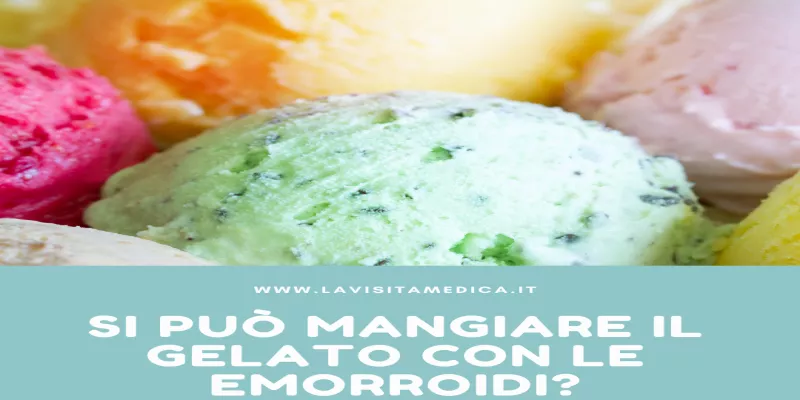Can you eat ice cream with hemorrhoids?

In general, the scientific community agrees that no direct relationship can be found between inflammation and problems of this type and the consumption of a good part of dairy products.
Best Hemorrhoid Products
This leads us to consider most ice creams compatible with the diet of those who suffer from hemorrhoids, provided that only those with a low caloric impact are chosen.
Can you drink milk with hemorrhoids?
Technically, hemorrhoids are varicose dilation's of the veins surrounding the rectum and anus. We are talking about internal and external problems, depending on whether the upper and lower hemorrhoidal plexus are affected. It is a fairly common problem, especially for men of mature or advanced age.
They are linked to constitutional problems, such as poor elasticity of the venous walls or their weakness, but above all circulatory problems. Furthermore, there are elements that favor the onset of hemorrhoidal conditions, such as a disordered and too loaded diet, which however lacks fiber.
While dairy products are not a direct cause of hemorrhoid problems, the caloric intake of a very high consumption of cheeses, especially aged ones, can be a trigger, especially in subjects who already have this type of problem or the associated lesions.
In case of risk of hemorrhoids , consuming dairy products can be useful, especially when they contain probiotic bacteria such as yogurt, kefir and many types of fresh soft cheese. They also offer a good supply of prebiotic molecules, especially polysaccharides and dietary fiber. Lactose is an important polysaccharide, as are many other components of milk.
Having a good intestinal bacterial flora, correlated with the consumption of dairy products, allows the production of molecules that are needed by enterocytes and offer a considerable improvement in the conditions of the intestinal mucosa, in particular polyamines and butyric acid.
However, it is always advisable to choose low-fat dairy products, because you need to control the amount of proteins and lipids that partly regulate the fecal pH. The intestine needs a slightly acidic environment, which can be helped by different types of dairy products.
Furthermore, some fats have an emollient action on the stool, thus making the traumatic manifestation of hemorrhoids more difficult.
Hemorrhoids: what to eat for breakfast
Coffee, cocoa and fermented tea, as well as all sources of theine and caffeine must be eliminated from breakfast, because by their nature they can expose you to the risk of hemorrhoids and make their reabsorption more difficult.
In addition to these, added sucrose and glucose must be removed from breakfast and other meals, so drinks cannot be sweetened. Sodium chloride and most food additives must also be removed.
If you choose tea, as already mentioned unfermented, you should prefer the one with a low tannin content. You should avoid all astringent foods, such as unripe persimmons, unripe bananas and many citrus fruits.
The latter, however, only in the case of constipation, otherwise it can be consumed in moderation. An orange fruit or grape fruit, if it is inserted in a context of general balance and non-serious hemorrhoids, is not necessarily to be discarded because it provides vitamin C which promotes superficial revascularization of many areas of the body.
Fermented dairy products, especially yogurt and kefir, are great allies against the onset of hemorrhoids, because they provide excellent concentrations of slow-release liquids and help distend the walls of the colon, softening the stool and reducing the production of gas that can be annoying.
All sources of dietary fiber can be added to breakfast, but without overdoing it, preferring those of vegetable origin.
What to eat for lunch with hemorrhoids?
In case of hemorrhoids, all foods that can be irritating and alter the pH by moving it towards basic are completely banned from lunch and dinner.
Alcohol and spicy spices, such as peppers, chili peppers, pepper and paprika are to be avoided 100%. It is necessary to avoid eating foods that are too salty, therefore aged cheeses and strong and spicy ones, while for fresh ones the problem is less and in fact in many cases they help.
Red and prepared meat should be removed, especially sausages and canned foods, as well as all fats of animal origin and butter-based products.
Any type of fried food, seafood and shellfish are banned from lunch and dinner for those who suffer from hemorrhoids, as well as eggplant, garlic and onion. Even soffritto cannot be used, so the recipes that require it, in the best case, should be reviewed.
In general, all spicy foods are prohibited. Instead, meat broth, oats, which are also good for breakfast, chestnuts, raw or cooked cabbage and beetroot are recommended.
In moderation, you can choose naturally leavened foods, leeks both cooked and raw, although it would be better to avoid them, sage, which is anti-inflammatory and a good antibiotic that preserves the surfaces of the perianal area, and yogurt.
Dandelion and in general plant-based foods rich in fiber such as seasonal herbs are very good and actually help in the removal of any fecal residues present inside the intestine and colon, which could cause problems at the exit stage due to their pH.
In this way, you also avoid the onset of irritable bowel problems and other inflammations that could contribute to creating a hostile environment for those who already suffer from hemorrhoid clusters.
Add new comment